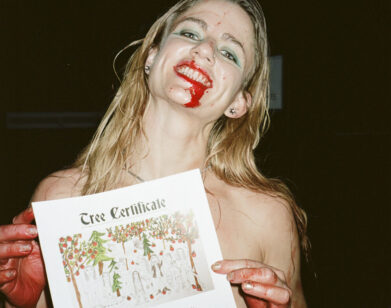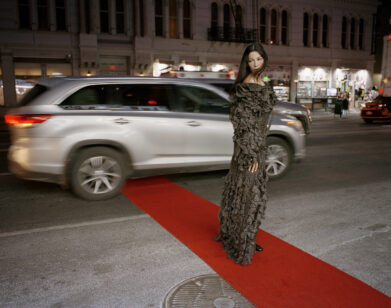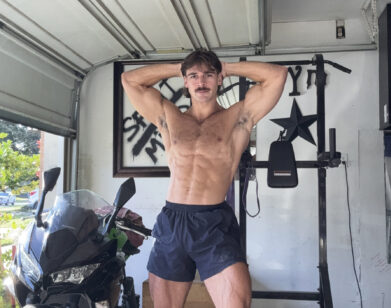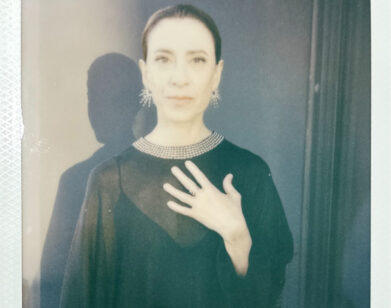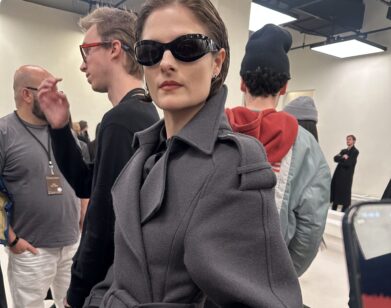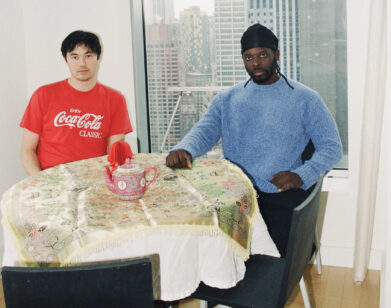The Balanced Resi Stiegler
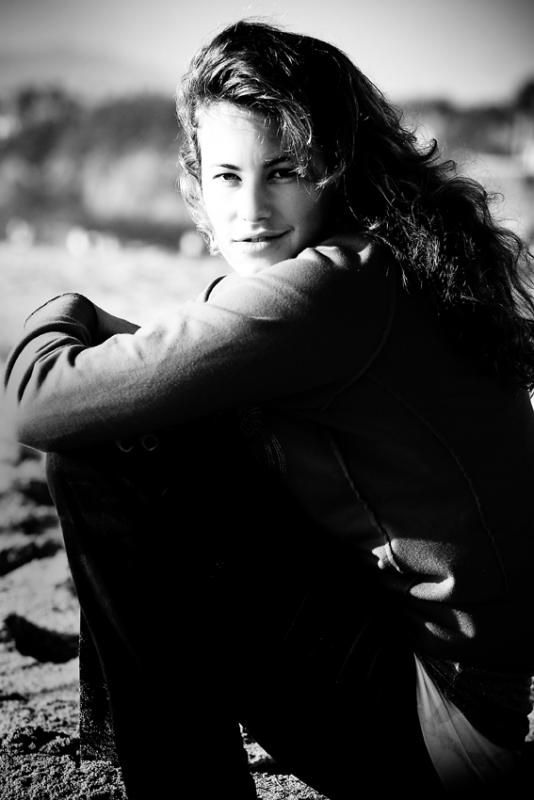
ABOVE: RESI STIEGLER. PHOTO COURTESY OF KEVIN PRITCHARD
Olympic slalom skier Resi Stiegler is constantly on the move—both on the slopes and off. When we got in touch with her by phone, she was at the airport on a layover; she’d taken advantage of a rescheduled race to take a few days off, stopping at home in Jackson Hole and then heading to Maui to be with her boyfriend before the madness of the Olympics begins this week.
It was, to some extent, a matter of fate that 28-year-old Stiegler should become a skier: her father, Josef Stiegler, was an Olympic champion in the ’60s, and growing up in Jackson Hole, skiing was a natural pursuit for Stiegler and her younger brother, Seppi, who’s also a member of the U.S. Ski Team. Since she started skiing at age two, Stiegler has amassed an impressive 17 World Cup Top 10 finishes.
Though her career choice may not have been an unexpected one, Stiegler’s approach to the life of a full-time athlete has been all her own. For her first Olympics, at Torino in 2006, when she was just 20, Stiegler fought a three-day battle with the International Olympics Committee for the right to wear her signature stuffed tiger ears on her helmet. Since then, she has persevered through multiple serious injuries to recover in time for this year’s Olympics, in which she’ll comprise the technical team along with Mikaela Shiffrin, the 18-year-old up-and-comer for whom Stiegler is something of a mentor.
ALEXANDRIA SYMONDS: I was really surprised that you were going to have any time at all to talk to me in the couple of months before the Olympics. How crazy is your schedule right now?
RESI STIEGLER: It’s pretty crazy. Most of our races have already happened, so right now it’s a little bit of a break, to recharge, and then we head back for the last couple of races before the Olympics. And we’ll do some prep, like a week of training somewhere before the Olympics, before we head over. And then Mikaela Shiffrin and I, we’re the tech team, so we do Slalom and GS [Giant Slalom], and that’s at the end of the Olympics. So we don’t have to go over right away, which is nice, and we’ll just go over, pretty much for the races, so that we’re eating healthy, and not in Russia, getting tired from all of the hype.
SYMONDS: So you’re not going to take much advantage of the Olympic Village?
STIEGLER: No. For her, I think she’d be a little more upset, because I’ve been to the Olympics before, so for me it’s a little bit more about the competition this time around.
SYMONDS: Have you skied in Sochi before?
STIEGLER: I did, I went last year, in February, to kind of see what it was like, and test out the snow, so that we’re not getting there and having no idea what’s going on. [laughs]
SYMONDS: How does it compare to other places in the world?
STIEGLER: It’s actually like a beautiful resort, it’s quite large. I wasn’t expecting that. The mountain ranges there are bigger than I thought they would be, and the snow was really fantastic. There just wasn’t anything ready at that time. I think that’s going to be shocking to me.
SYMONDS: It’s crazy how fast that goes up.
STIEGLER: I know! There were like five hotels and that was it. There was tons of construction, but nothing at all like it was going to be once it was ready.
SYMONDS: What are some of your favorite slopes in the world?
STIEGLER: I’m from Jackson Hole, so it’s very hard not to be [biased]. [laughs] That’s my favorite place to ski, and I think it’s so beautiful there. Any place in Switzerland, like St. Moritz. My favorite resort would probably be Courchevel in France, which is part of the Trois Vallées, which is the biggest ski area in the world. It’s just so beautiful, the mountains are so pristine, just breathtaking. They’re huge. It’s wild to be able to travel all around and ski in all these different mountain ranges, and see the world that way.
SYMONDS: Do you get the opportunity, when you’re going down a slope, to take in how beautiful it is around you, or are you so concentrated on what you’re doing that that stuff just goes right by you?
STIEGLER: I really enjoy exploring where we are and really taking it all in, because I’ve had a long career and it didn’t go exactly the way I wanted it to. For me, taking little things, like being able to see all these different places that I’ve been, and cherish them, and be able to see them—really see them—is something that I’m passionate about. I enjoy all the little streets in a ski town, or being able to ski around if you’ve got a couple extra hours on the hill, or going around and skiing to the very top of the mountain and checking everything out. I’m into photography, so I really enjoy taking photos of all the places that I’ve gone. I think that’s the coolest part about what we get to do, we get to travel around and see the world for free, you know, technically. [laughs] And get to see different cultures, and all the different people that I’ve met along the way—it’s a pretty awesome job.
SYMONDS: I’ve looked through your blog a little bit, and it looks like you have a very sort of Zen, yogic attitude about getting to experience all that.
STIEGLER: Yeah, I kind of have to, I think, when you’re traveling around as much as we have to. It’s a bit chaotic. You’re constantly traveling and moving. It’s not all amazing and beautiful all the time, but you try to make it that way, and you know, you better enjoy what you’re doing. I do.
SYMONDS: I guess that with your dad being who he is, there was never any question about whether you were going to learn to ski, right?
STIEGLER: Yeah, yes. [laughs] Where I grew up and who my family is, they’re all big skiers, so I don’t think I had a choice, but I definitely wasn’t pushed into it. Which is actually kind of fascinating for some people—my dad, I think, would have rather had me study something, and make a living that’s a little bit more stable. But they made it so much fun, and being born into it was almost too easy for me to not love it immediately.
SYMONDS: At what point did you realize that skiing was going to be your life, and you were never going to go study and become an accountant or a teacher or?
STIEGLER: I think some people had, probably, a time in their life where they were good at two things and they had to make a big decision. For me, it was never like that—I just skied every day of my life and kind of made the right steps in the right direction, and so there wasn’t really a choice of like, “What should I do?” I remember when I was like 10 years old, I was just wanting to be in the Olympics and wanting to compete in the World Cup, and there was never another choice in my head. I felt like I had learned so much at a young age, or been exposed to a lot as a young kid. I was traveling the world, going to Europe on the World Cup when I was 15, and away from my family even earlier, because I went to school for skiing. I guess I just knew that this was what I was going to do, and do it until I was either hating it or done, you know?
SYMONDS: Especially when it’s something that’s so, both physically and emotionally, demanding. You have to love it, right?
STIEGLER: And it kind of steals your life away, you have to be okay with that. To devote everything to skiing, and really make sure you give up everything for it if you want to succeed the way you dreamed. That’s the hard part—just completely diving in and not being able to go out or go on trips with your friends. I guess the mature part of it is also seeing that you get to do this amazing thing.
SYMONDS: What are the relationships like on the Women’s Ski Team? It seems like you guys really bond.
STIEGLER: Yeah, we’re all really close. We kind of have to be, because we travel so much more than the rest of the World Cup circuit. Most athletes get to go home in between each event, because we pretty much compete in Europe all winter, so most people are racing in France and then they can at least drive home six hours to their house in Austria or something. We don’t, we’re with each other all day, every day, and we train in the summer as well. I think that’s why the U.S. has done so well, because we support each other and we really push each other to have fun and work hard. We’ve built some really amazing relationships over the years.
SYMONDS: What’s your spot in the group? If you had to ask the other women to describe you, what do you think they would say?
STIEGLER: That I’m extremely hyper. [laughs] Our team’s a little different this year, because we’ve had a couple girls get injured, but on the tech team there’s actually only two of us, Mikaela and I, and she’s actually a lot younger and she travels with her mom. My best friend, racing for 10 years is Sarah Schleper and we definitely make sure—kind of the same thing with Julia Mancuso—we always made a pact that everywhere we’d go we’d go explore the place and pick something out that we enjoyed about it. So I think that we’re all quite good at getting each other to have a good time. You’re competing, and some days you’re doing really well, and other days you’re not doing that well. So you just have to make sure you’re having fun and exploring and doing all those kind of things. But I guess I’m kind of the motivator of the group.
SYMONDS: With just you and Mikaela on the tech team, have you two gotten especially close? Do you see yourself as like a protective big sister?
STIEGLER: I do get kind of protective of her. I don’t know what people thought of me when I was young, but she is so sweet and innocent that you want to help out. It’s like a natural thing to want to give her advice or help her out, but she’s pretty not like a normal 18-year-old, either. She’s very mature and she’s done so well at such a young age, so it’s kind of cool to learn from her as well, in a way. She’s an amazing skier and she works really, really hard. I think that’s what’s so fun about being around her, she’s inspiring and motivational, but she’s also very open to hearing your career and your stories. We’ve definitely had some great up-late conversations just talking about things, each other’s lives, and careers, and boys. [laughs] Normal stuff.
SYMONDS: When you’re getting ready for a race, and you’re on the ski lift going up, what’s going through your mind? What are you thinking about in that moment?
STIEGLER: I love this question, because I think it’s actually one of the key points in the day. So many people just don’t understand. We train our whole lives for like a minute and a half. We’re not soccer or tennis players that can play the whole game. I’m sure their mental game is just as difficult, but it’s just different—everything you do around this one minute and a half is so powerful.
Once you’re in the World Cup, you’re physically prepared, so then ski racing almost always comes down to more mental than physical. Because if you’re out there skiing, then you’re physically okay, and you tell yourself that: “Okay, I’m physically prepared, I’m ready for this race.” But then the mental part is a constant fight, up until that last chair ride, going to the start, and kind of calming down. For me, recently I’ve been working on understanding that I’ve done everything that I can up until this point, and now I need to breathe and enjoy the moment, and do what I know I can do, versus trying to do more. Because you’re fighting to do more, but that doesn’t always work.
THE 2014 WINTER OLYMPICS WILL AIR STARTING FEBRUARY 6 ON NBC.

